Middle East Space Roundup: 17 to 23 February 2025
A summary of all the space news in the Greater Middle East over the past week, brought to you by AzurX
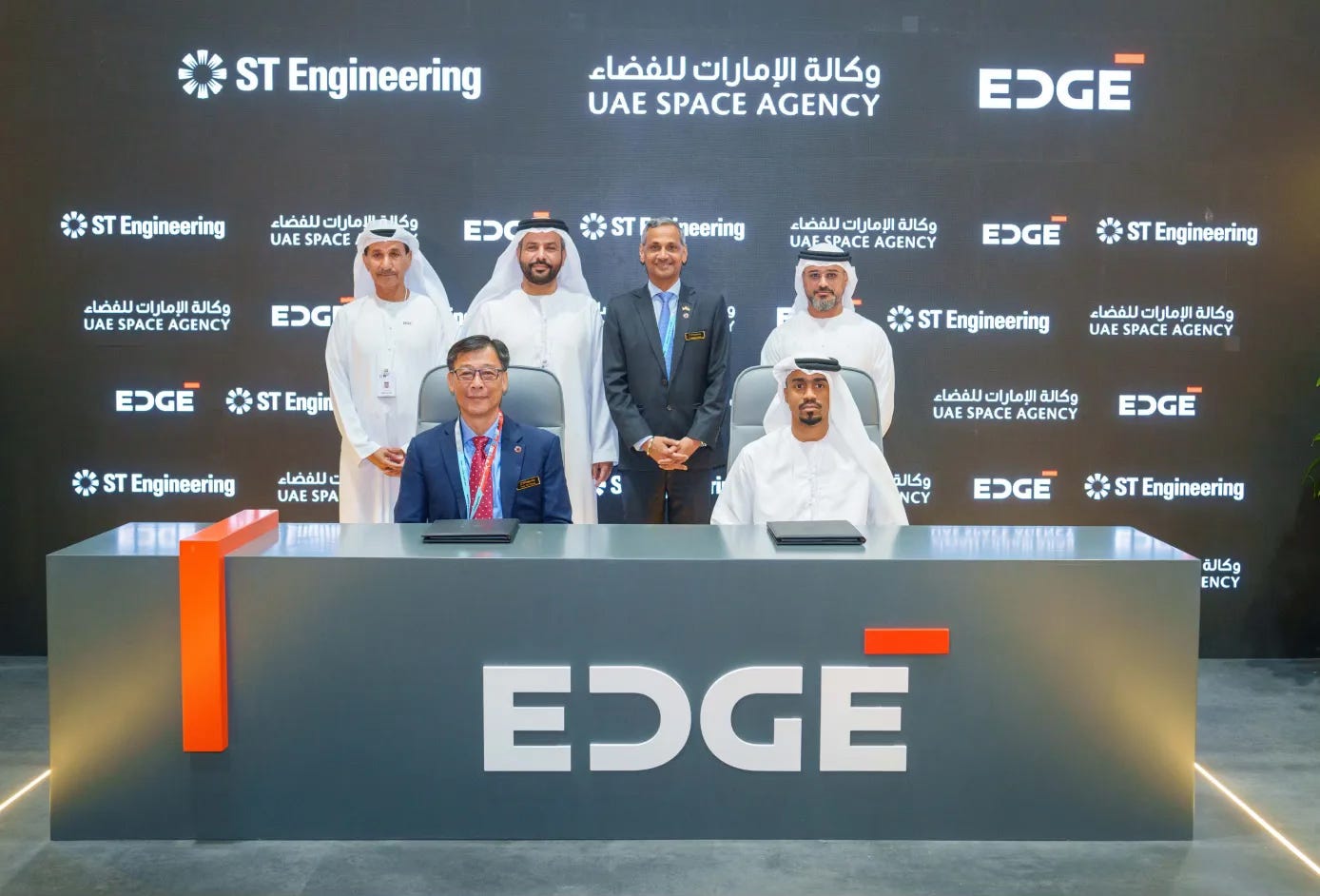
The following are the major space developments in the Greater Middle East region tracked by Middle East Space Monitor over the past week:
UAE Space Developments
UAE’s EDGE Group Selects Singapore’s ST Engineering for Sirb SAR Program
EDGE Group has partnered with ST Engineering to accelerate the UAE’s sovereign synthetic aperture radar (SAR) satellite capabilities under the UAE Space Agency’s Sirb Program. As the program’s prime contractor, EDGE formalized the collaboration through a Letter of Intent with ST Engineering, marking a key milestone in strengthening the UAE’s radar Earth observation capabilities. The partnership aligns with the UAE’s National Space Strategy, focusing on expanding private sector involvement and fostering a competitive commercial space industry. Under the agreement, ST Engineering will support the development of a single-polarisation SAR satellite, provide ground segment solutions, and transfer technical expertise for the SAR payload. This initiative reinforces the UAE’s commitment to high-resolution satellite imaging, autonomous space systems, and long-term space sector sustainability, positioning the country as a leader in advanced satellite technology and innovation.
UAE’s Space42 and FADA Create Earth Observation Satellite Joint Venture
Space42 and FADA, an EDGE Group entity, have signed a Memorandum of Understanding (MoU) to establish a strategic joint venture aimed at strengthening the UAE’s sovereign space capabilities. The partnership will develop a fully integrated Earth observation (EO) ecosystem, leveraging Space42’s expertise in AI-driven geospatial analytics and FADA’s leadership in advanced technology and defense. The joint venture will serve as a central hub for manufacturing, deploying, and operating EO assets, supporting both government and commercial applications across sectors such as environmental monitoring, urban planning, and resource management. Aligned with the UAE Space Strategy 2030, the initiative will enhance local research and development, contribute to in-country satellite manufacturing, and accelerate the deployment of next-generation satellite constellations. Additionally, the JV is designed for international expansion, aiming to commercialize AI-powered geospatial solutions in emerging markets. By integrating advanced space assets with AI-driven analytics, the collaboration positions the UAE as a global leader in space-based intelligence, technological autonomy, and sustainability-focused space applications.
Space42 Executive: UAE to Start Partial Satellite Manufacturing In 2026
Space42 is set to begin partial satellite manufacturing in the UAE this year, with full-scale production expected by 2026, marking a key milestone in the country’s Earth observation (EO) capabilities. In partnership with ICEYE, a leader in synthetic aperture radar (SAR) technology, Space42 is facilitating technology transfer and knowledge exchange to strengthen its satellite development initiatives. This collaboration directly supports the UAE’s EO Program, aimed at enhancing national remote sensing and satellite capabilities. Speaking at IDEX 2025, Space42 CEO Hasan Al Hosani highlighted the company’s growing expertise in space communications and AI-powered geospatial solutions. The firm has already launched two operational satellites under its Foresight constellation, advancing geospatial intelligence with increased speed and precision. As part of its showcase at IDEX, Space42 unveiled the first satellite image captured of Abu Dhabi, underscoring the progress in its EO satellite missions and the UAE’s broader ambitions in space technology.
CEO of UAE’s EDGE Group Describes Strategic Role of FADA Space Company
The UAE’s EDGE Group solidified its leadership at IDEX 2025 with major defense sector announcements, including a €500 million service support contract for its MAESTRAL joint venture with Fincantieri and the unveiling of its Falaj-3 offshore patrol vessel. CEO Hamad Al Marar outlined EDGE’s ambitions beyond traditional defense, emphasizing the strategic role of its new space entity, FADA, in military space applications such as reconnaissance and communications satellites. He stressed the importance of maintaining sovereign control over satellites and aligning UAE stakeholders in upstream and downstream space operations. Looking ahead, EDGE aims for international expansion through alliances, leveraging advanced AI and technology-driven solutions to position itself as a global defense and aerospace leader over the next five years.
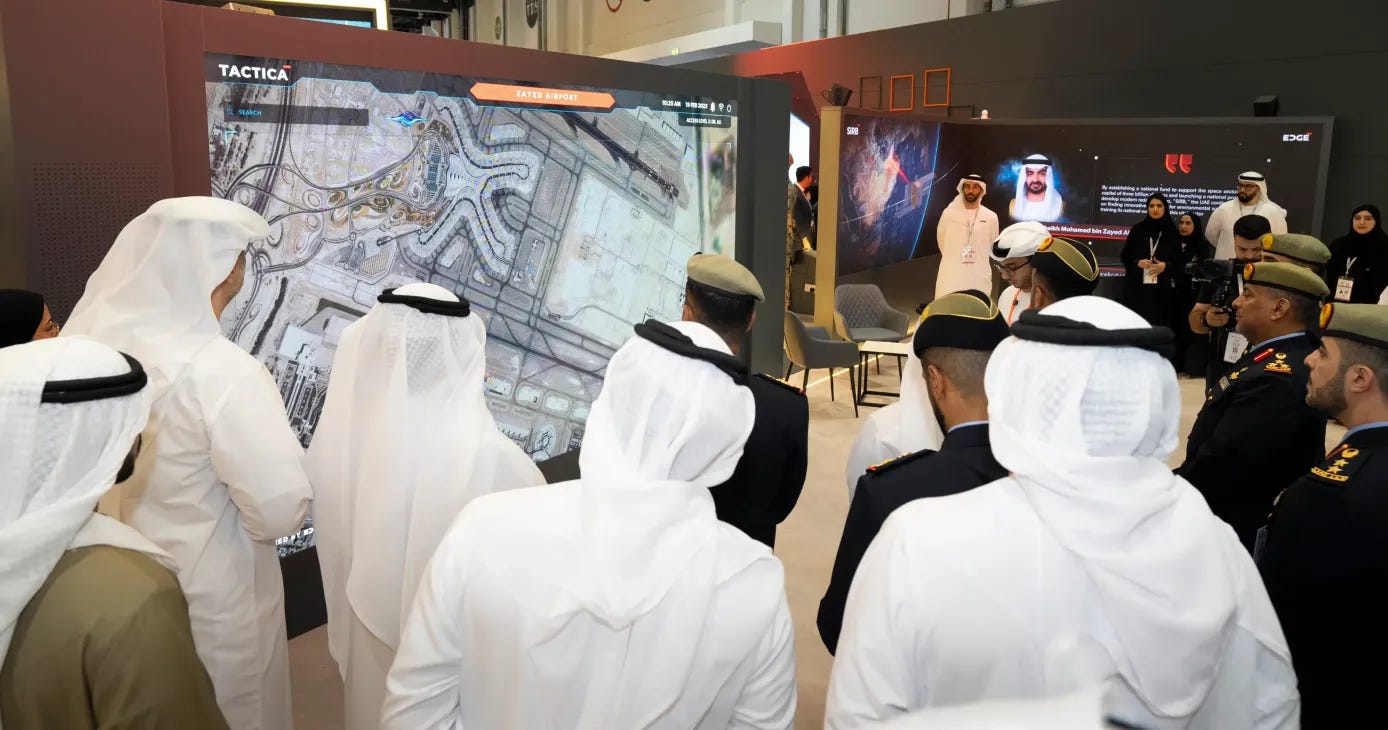
UAE’s FADA Unveils TACTICA AI-Powered Geospatial Intelligence Platform
The UAE’s FADA, EDGE Group’s sovereign space and satellite company, has unveiled TACTICA, an AI-driven multi-source intelligence platform at IDEX 2025, marking a significant advancement in the UAE’s sovereign space and defense capabilities. TACTICA integrates satellite imagery, signals intelligence, sensor data, and open-source information to deliver real-time, actionable insights across defense, security, and strategic planning. Powered by Generative AI (GenAI) and the Falcon large language model (LLM) developed by the Technology Innovation Institute (TII), the platform enhances situational awareness through voice-command interaction, geospatial visualization, and autonomous data analytics. This initiative underscores EDGE’s strategic focus on AI-powered decision-making, reinforcing its leadership in autonomous intelligence, operational efficiency, and smart defense solutions. The launch signals FADA’s commitment to leveraging AI for mission-critical applications, ensuring the UAE remains at the forefront of next-generation space and cyber technologies.
UAE’s EDGE Group Secures $61.8 Million Order For GPS Anti-Jamming Devices
The UAE’s EDGE Group has secured a $61.8 million contract from the UAE Ministry of Defence to supply GPS-PROTECT anti-jamming systems, reinforcing the country’s electronic warfare capabilities. Signed at IDEX 2025, the deal will see EDGE’s electronic warfare division, SIGN4L, produce and deliver these compact, cost-effective systems designed to shield global navigation satellite system (GNSS) receivers from interference and jamming. The GPS-PROTECT system is deployable across air, land, and sea assets, ensuring uninterrupted satellite signals in contested environments. EDGE’s President of Trading and Mission Support, Omar Al Zaabi, emphasized the system’s critical role in maintaining operational superiority across the electromagnetic spectrum, highlighting satellite technology’s growing significance in modern defense strategy.
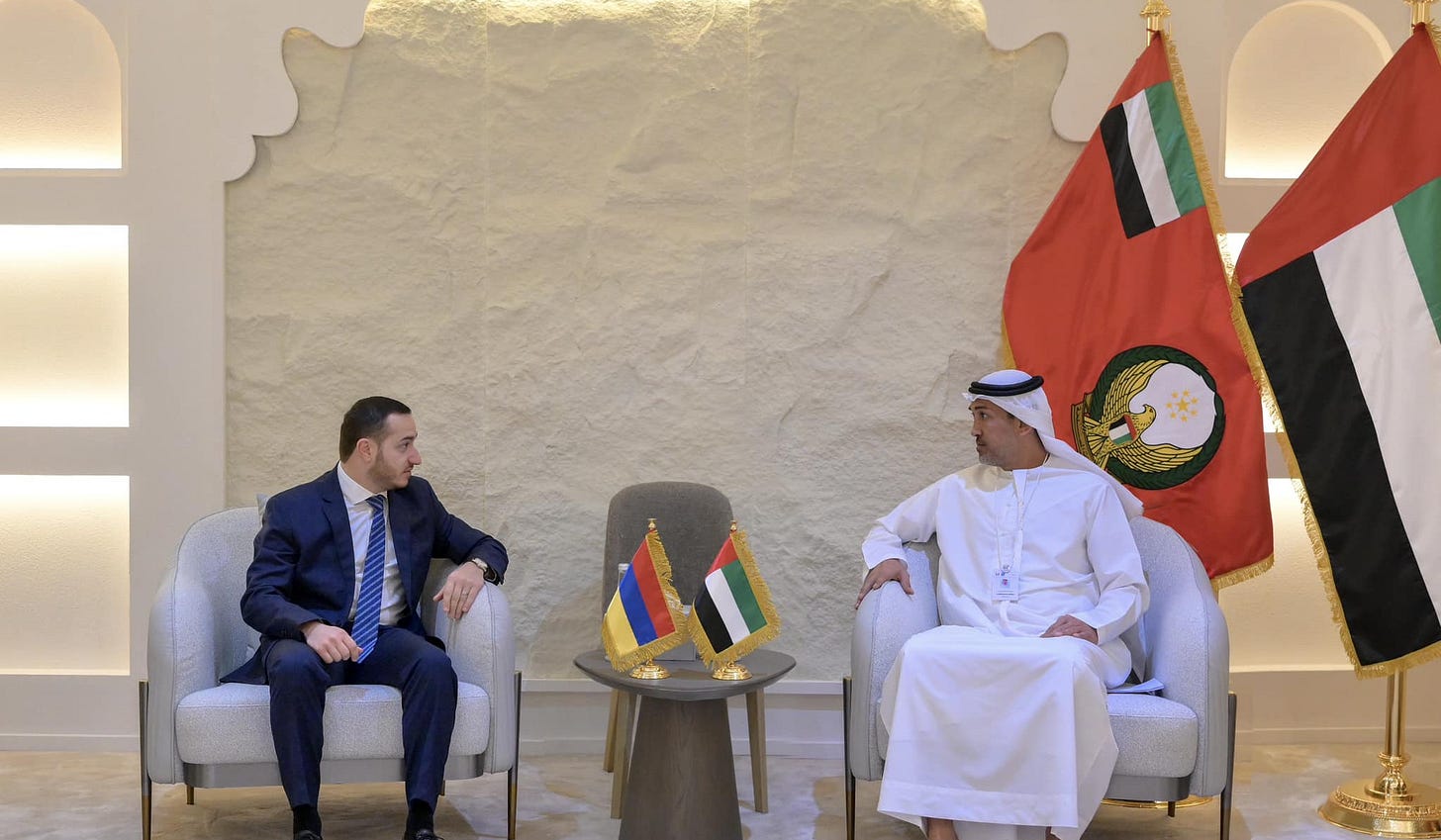
UAE and Armenia Hold Talks on Space Technology Collaboration
Armenia and the UAE are strengthening their collaboration in space and high-tech industries following meetings between Armenian High-Tech Industry Minister Mkhitar Hayrapetyan, UAE Minister of State for Defense Affairs Mohammed bin Mubarak bin Fadhel Al Mazrouei, and UAE Space Agency Director General Salem Al Qubaisi in Abu Dhabi. The discussions focused on expanding bilateral cooperation, aligning with the Artemis Accords for peaceful space exploration, and advancing scientific research and experimental development. Armenia outlined its vision for space sector growth, while the UAE shared insights into its space achievements and upcoming projects. Both countries agreed to pursue joint initiatives aimed at fostering innovation, developing space technologies, and contributing to scientific and technological progress. These engagements reflect Armenia’s increasing interest in leveraging UAE’s expertise to advance its own space and defense technology capabilities.
UAE, Ukraine Sign Comprehensive Economic Partnership Agreement, Includes Space Sciences
The UAE and Ukraine have signed a Comprehensive Economic Partnership Agreement (CEPA), marking Ukraine’s first such deal with a Gulf country and signaling a major boost in trade and investment ties. The agreement immediately eliminates customs duties on 99% of Ukrainian imports of UAE goods and 97% of Ukrainian exports to the UAE, facilitating increased economic activity across key sectors, including infrastructure, heavy industries, aviation, space sciences, and IT. With bilateral trade recovering from wartime disruptions—reaching $372.4 million in 2024—the CEPA is projected to contribute $369 million to the UAE’s GDP and $874 million to Ukraine’s GDP by 2031. This deal aligns with the UAE’s broader economic diversification strategy to expand non-oil trade to $1.1 trillion by 2031 and double its economy to over $800 billion by 2030. The UAE has now signed 24 CEPA agreements covering markets with a combined population of 2.5 billion, reinforcing its global trade leadership. The signing coincides with President Volodymyr Zelensky’s visit to the UAE and precedes his upcoming discussions with Saudi Crown Prince Mohammed bin Salman, while high-level Russian and U.S. officials meet in Riyadh to explore resolutions to the ongoing conflict in Ukraine.
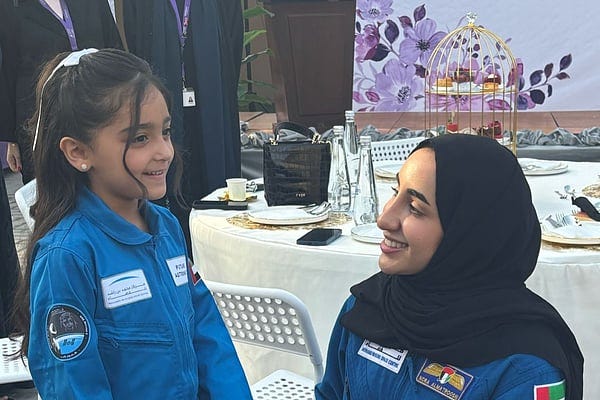
UAE Astronaut Noora Al Matrooshi Hopes to Plant UAE Flag on the Moon
Noora Al Matrooshi, the UAE’s first female astronaut, shared her aspirations to plant the UAE flag on the Moon and contribute to future Mars missions during a talk with students in Dubai. Emphasizing the growing role of women in space, she encouraged young Emiratis to seize opportunities in the UAE’s space program. Al Matrooshi, who trained at NASA’s Johnson Space Center and the Mohammed Bin Rashid Space Centre (MBRSC), highlighted the UAE’s involvement in the Lunar Gateway program and its partnerships with NASA, JAXA, CSA, and ESA. Her journey from mechanical engineering to astronaut training, which includes piloting jets and conducting spacewalk simulations, serves as an inspiration for the next generation. Honored at the Woman of Distinction event, Al Matrooshi’s achievements were celebrated as a breakthrough for Emirati women in STEM fields, reinforcing the UAE’s commitment to advancing space exploration and fostering homegrown talent.
UAE Scientists Play a Key Role in Astrophysics Discovery
Scientists in the UAE have played a key role in a groundbreaking astrophysics discovery, identifying a neutrino with 30 times more energy than any previously detected. This breakthrough, achieved through data from the Mediterranean-based KM3NeT telescope, highlights the UAE’s growing presence in global space research, particularly through Khalifa University’s involvement in the project. The discovery, published in Nature, marks a significant advancement in understanding high-energy cosmic events such as supernovae and black holes. The UAE’s investment in space science continues to grow, with increasing interest among students, expanding research initiatives, and national efforts to establish the country as a leader in space exploration. Emirati PhD students, such as Abdulrahman Al Hebsi, are actively contributing to astroparticle physics, reflecting the broader momentum in the UAE’s scientific ecosystem. This aligns with the country’s ambitious space strategy, which includes deep-space exploration and strengthening international research collaborations. With institutions like Khalifa University and agencies such as the Mohammed bin Rashid Space Centre (MBRSC) fostering talent and innovation, the UAE is rapidly positioning itself as a key player in advanced space science and astrophysics.
Oman Space News
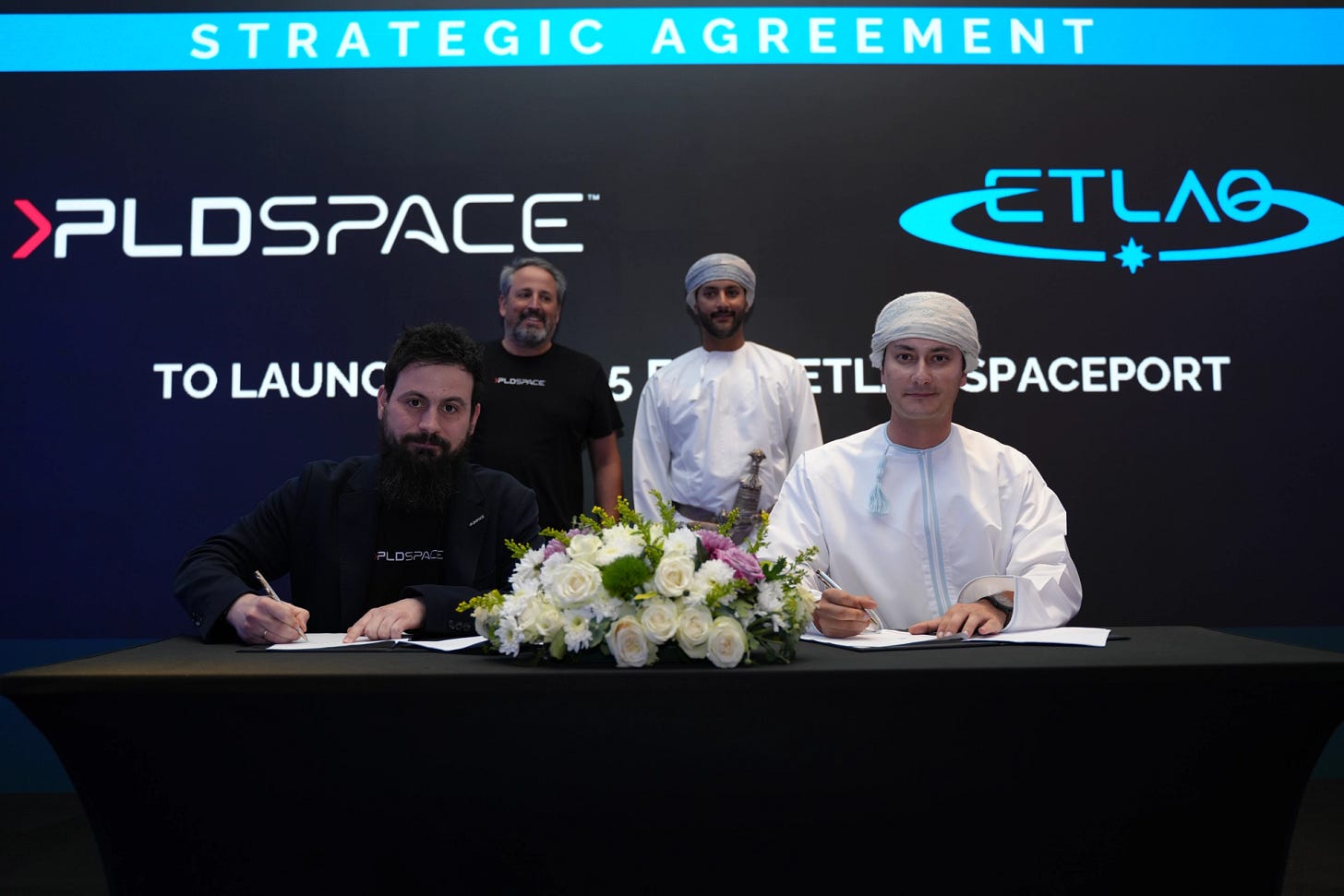
Spain’s PLD Space Selects Oman’s Etlaq Spaceport as Second Global Launch Site for MIURA SLV Launches
Spain’s PLD Space has selected Oman’s Etlaq Spaceport as its second global launch base for the MIURA launch vehicle family, expanding its service deployment beyond its existing operations at the CSG spaceport in Kourou, French Guiana. The partnership, announced at the Etlaq Launch Conference 2025 in Muscat, was formalized through an agreement between PLD Space Co-founder and CBDO Raúl Verdú and Etlaq CEO H.H. Sayyid Azzan bin Qais Al Said. This collaboration positions PLD Space as the first major operator at the Omani spaceport, providing launch capabilities for the Middle East market and ensuring access to commercially relevant orbits, including GEO, SSO, and Polar. With plans to integrate a third launch site in the coming year, PLD Space is advancing its goal of 30 MIURA 5 launches by 2030, enhancing global access to launch infrastructure amid increasing demand. The Duqm-based Etlaq Spaceport, strategically located near the equator, offers logistical advantages, stable weather, and extensive ocean downrange, making it an optimal site for both commercial satellite launches and future crewed missions with PLD Space’s LINCE capsule. The collaboration also aligns with Oman’s broader space sector ambitions, fostering high-skilled job creation and technological development within the country.
Oman’s Etlaq Spaceport Plans Five Launches in 2025, Including for Kuwait Space Rockets
Oman is set to accelerate its space ambitions with five planned rocket launches from the Etlaq Spaceport in Duqm, beginning in April 2025. The spaceport, which aims to become a hub for suborbital and experimental launches, will host missions from various international and regional start-ups, including Kuwait Space Rockets. As part of its Genesis Program, Etlaq is positioning itself for commercial operations by 2027, aiming to attract global launch companies by adhering to U.S. Federal Aviation Administration (FAA) safety standards. In addition to launching vehicles, Etlaq will introduce a public fan zone to engage the community and boost interest in space exploration. The growing investment in spaceports across the region, including the UAE’s horizontal launch initiatives and Saudi Arabia’s push into space tourism, underscores the increasing role of Gulf countries in the expanding global space economy. By offering a dedicated facility for high-altitude and suborbital testing, Oman’s spaceport could serve as a strategic asset for Arab countries looking to establish a stronger presence in the commercial space sector.
Oman’s Etlaq Spaceport Hosts First Etlaq Launch Conference
The first annual Etlaq Launch Conference in Oman marked a significant milestone in the country's space ambitions, bringing together key industry players to outline future launch activities and strategic collaborations. Highlights included a recap of the Duqm-1 experimental rocket launch, the unveiling of the Genesis Program for rapid suborbital mission deployment, and the announcement of a 2025 launch calendar featuring five planned missions from partners in the UK, New Zealand, and Kuwait. The event also hosted a showcase of emerging launch providers, including Advanced Rocket Technologies, Stellar Kinetics, and Kuwait Space Rocket, alongside a panel discussion on Oman’s evolving space ecosystem featuring PLD Space, SatMENA Oman, ETCO Space, NASCOM, and the Ministry of Transport, Communications, and Information Technology (MTCIT). Notably, Etlaq Spaceport introduced its new brand identity inspired by Duqm’s coastal environment, while the Oman Society of Astronomy and Space expanded its role within the national space sector. Major agreements were signed, including a strategic partnership with PLD Space for MIURA-5 launches from Oman and an MoU with SatMENA Oman to enhance satellite communications services. These developments position Etlaq Spaceport as a key regional hub for launch operations, reinforcing Oman’s role in the expanding global space industry.
Saudi Arabia Space Developments
Australia’s Myriota Graduates Saudi Arabia’s CST Regulatory Sandbox for Satellite IoT Services
Australia’s Myriota has successfully graduated from Saudi Arabia’s Communications, Space and Technology Commission’s (CST) Emerging Technologies Regulatory Sandbox program, marking a significant step in expanding satellite-based Internet of Things (IoT) solutions in the Kingdom. In collaboration with CST, Saudi Telecom Company (STC), and Giza Systems, Myriota deployed connected smart water meters in remote areas for the Saudi Ministry of Environment, Water and Agriculture, addressing critical challenges in regions with limited or no cellular connectivity. The company’s ultra-low-power satellite network is designed for industries such as logistics, utilities, and agriculture, enabling real-time monitoring of assets worldwide. Myriota’s CEO, Ben Cade, emphasized the growing demand for satellite IoT and the company’s commitment to supporting digital transformation in the Middle East. With a recent US$32 million funding round led by Australia’s National Reconstruction Fund Corporation (NRFC) and Main Sequence, Myriota is poised to expand its global footprint, democratizing satellite IoT access and advancing critical infrastructure monitoring.
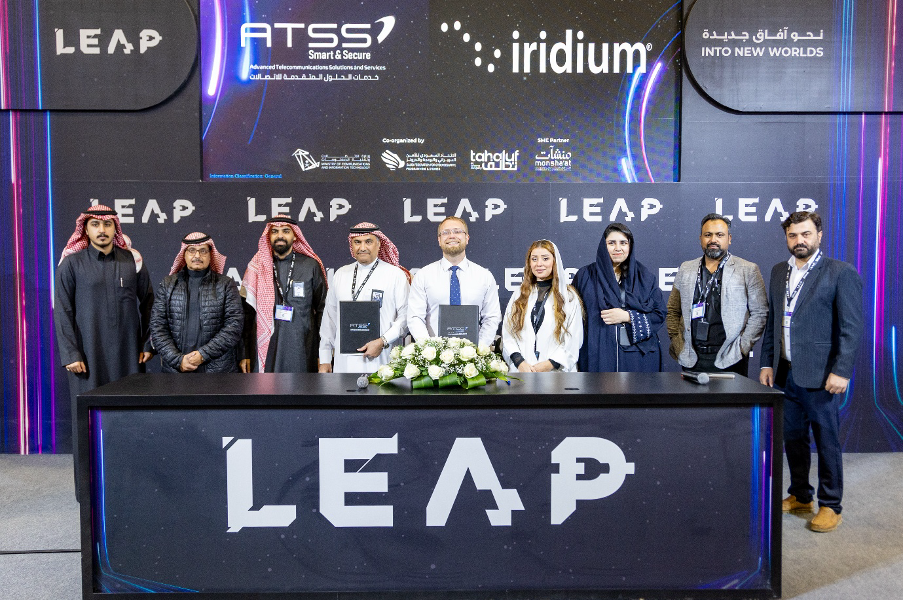
Saudi Arabia’s ATSS Signs MoU With Iridium for Smart City SATCOM Enhancements
Saudi Arabia’s Advanced Telecommunications Solutions and Services (ATSS) and Iridium Communications Inc. have signed a Memorandum of Understanding (MoU) to enhance smart city connectivity across Saudi Arabia by integrating satellite communication with Internet of Things (IoT) and AI-driven solutions. This partnership aligns with Vision 2030 and aims to improve urban infrastructure through smart traffic management, public safety, environmental monitoring, and industrial automation. By leveraging Iridium’s global satellite network and ATSS’s expertise in smart infrastructure, the collaboration will enable seamless, real-time connectivity to drive digital transformation and urban sustainability. This initiative marks a significant step in strengthening Saudi Arabia’s position as a leader in smart city development, ensuring reliable and scalable communication solutions for the Kingdom’s rapidly evolving digital landscape.
Saudi Arabia’s ATSS Signs Service Agreement With Intelsat for SATCOM Coverage Over Kingdom and MENA
Saudi Arabia’s ATSS also signed a Service Agreement with Intelsat to enhance satellite communications across Saudi Arabia and the broader MENA region, reinforcing its role in providing secure and resilient connectivity solutions. This partnership leverages Intelsat’s C-band and Ku-band satellite capabilities to support critical sectors, including infrastructure, smart cities, and government communications. By integrating Intelsat’s advanced satellite technology, ATSS aims to meet the growing demand for high-performance, uninterrupted connectivity, aligning with Saudi Vision 2030’s digital transformation goals. This collaboration underscores ATSS’s commitment to delivering innovative satellite services that ensure robust and scalable network solutions for government and industry stakeholders.
Saudi Arabia’s GACA Hosts Regional Satellite Search and Rescue Meeting
Saudi Arabia’s General Authority of Civil Aviation will host a four-day regional meeting in Jeddah from 24 to 27 February 2025, focusing on satellite-enabled search and rescue operations. The event will bring together representatives from Saudi Arabia, the UAE, Qatar, Algeria, Nigeria, and Togo, alongside officials from the Saudi Arabian Mission Control Centre, the Air Force, Border Guards, and the Ministry of Interior’s security services. As an early adopter of the International COSPAS-SARSAT Program, Saudi Arabia has played a key role in integrating satellite-based distress alert systems for aircraft, maritime vessels, and individuals. The meeting will include technical discussions and training workshops on leveraging satellite technology for real-time emergency response, strengthening regional cooperation in rescue operations. This initiative highlights Saudi Arabia’s leadership in advancing space-based safety systems and underscores its commitment to enhancing global search and rescue capabilities.
Saudi Arabia’s Abdullah Al Swaha Meets With SpaceX at Miami’s Future Investment Initiative
At the Future Investment Initiative in Miami (FII PRIORITY Miami 2025), Saudi Minister of Communications and Information Technology Abdullah Al Swaha engaged in high-level discussions with global industry leaders to strengthen Saudi Arabia’s position in technology, artificial intelligence (AI), investment, and the space sector. Meetings with NEA CEO Tony Florence focused on fostering tech entrepreneurship and startup investment, while discussions with Oracle CEO Safra Catz explored expanding cloud computing and AI collaboration to enhance digital infrastructure. Al Swaha also met with SpaceX President Gwynne Shotwell to advance Saudi Arabia’s ambitions in space exploration and rocket technology. Talks with SoftBank Group CEO Masayoshi Son and Vista Equity Partners CEO Robert F. Smith centered on expanding technology investment, asset management, and AI-driven initiatives. These engagements align with Saudi Vision 2030, positioning the Kingdom as a global hub for innovation, digital transformation, and space sector development.
Saudi Arabia’s CST Participates in Arab WTDC Meeting to Advance Space Economy
Saudi Arabia, represented by the Communications, Space, and Technology Commission (CST), participated in the Arab Regional Preparatory Meeting for the 2025 World Telecommunication Development Conference in Amman, Jordan, to help define regional strategic priorities for telecommunications over the next four years. Led by CST General Manager of International Affairs Eng. Muath Al Rumayh, the Saudi delegation emphasized the importance of advancing the global space economy through the adoption of cutting-edge space technologies. CST’s active role in hosting international conferences, such as the Space Debris Conference, underscores its commitment to fostering global cooperation on space sector challenges and opportunities. The upcoming World Telecommunication Development Conference in Baku, Azerbaijan, scheduled for 17 to 28 November 2025, will serve as a key platform to drive new collaboration models, enhance digital solutions, and align global telecommunications strategies with sustainable development goals.
Opinion: Saudi Arabia’s $2 Billion Space Program Taking Shape
In Arab News, Hamad S. Al Shehab and Hassan M. Al Zain write that Saudi Arabia's space ambitions have evolved from early pioneering missions, such as Prince Sultan bin Salman’s 1985 flight aboard NASA’s STS-51-G and the launch of Arabsat-1B, into a strategic national effort aligned with Vision 2030. With the global space economy projected to exceed $1 trillion by 2030, Saudi Arabia is positioning itself as a key player through a $2 billion investment in satellite development, space science, and tech-driven R&D. The Kingdom's initiatives, including the Space Tech Entrepreneurship Incubation Program and the National Semiconductor Hub, are fostering innovation, attracting significant investment, and enhancing technological localization. Saudi Arabia is also expanding partnerships with global space agencies, supporting advanced satellite research, and integrating space-based solutions into its broader economic diversification agenda. The National Satellite Data Center exemplifies this commitment by leveraging satellite intelligence for security, environmental monitoring, and urban planning. Additionally, Saudi Arabia is prioritizing sustainability in space by advocating for debris mitigation and responsible satellite decommissioning to counter growing orbital congestion. Workforce development remains central to the Kingdom’s strategy, with STEM education and international collaborations aimed at cultivating a new generation of space professionals. As Saudi Arabia builds its role in the rapidly growing space economy, it seeks to balance economic expansion with sustainable and responsible space operations, reinforcing its long-term commitment to innovation and global leadership in the sector.
Türkiye Space News
Türkiye’s Türksat-6A Completes First Test Broadcast on TRT World
Türkiye’s first domestically designed and manufactured communications satellite, Turksat-6A, has successfully completed its first test broadcast, marking a significant milestone in the country’s National Technology Movement. The satellite, developed by Turkish Aerospace Industries (TAI), defense firm Aselsan, and the Scientific and Technological Research Council of Türkiye (TUBITAK), transmitted its inaugural broadcast with TRT World, affirming Türkiye’s growing self-reliance in space technology. Industry and Technology Minister Mehmet Fatih Kacir and Transport and Infrastructure Minister Abdulkadir Uraloglu emphasized that this achievement reinforces Türkiye’s position among countries capable of independently manufacturing and operating satellites. As Türkiye advances its satellite capabilities, Turksat-6A is set to enhance the country’s communications infrastructure while supporting its broader ambitions in high-tech innovation and space sovereignty.
Minister: Türkiye’s Türksat Has Six Active Communication Satellites in Orbit
Türkiye's satellite ambitions continue to expand, with Transport and Infrastructure Minister Abdulkadir Uraloğlu emphasizing the country’s growing capabilities in satellite communications and space technology. With six active Türksat communication satellites—3A, 4A, 4B, 5A, 5B, and 6A—alongside the domestically produced Göktürk reconnaissance satellite, Türkiye has solidified its position as a key regional space player. The upcoming Türksat-6A, designed and manufactured entirely by Turkish engineers and companies, marks a significant milestone as the country’s first fully national communication satellite, expected to enter service imminently. Uraloğlu highlighted that Türkiye is among a select group of countries capable of launching three communication satellites within a span of just a few years, underscoring its accelerating progress in space technology. As Türksat-3A nears the end of its operational lifespan, preparations have begun for its replacement, which will be a more advanced, domestically developed satellite. Additionally, private sector involvement in space is increasing, with new satellite projects and close-orbit systems being developed. With Türksat expanding its service offerings and the broader space ecosystem gaining momentum, Türkiye is positioning itself as a significant player in the global satellite industry.
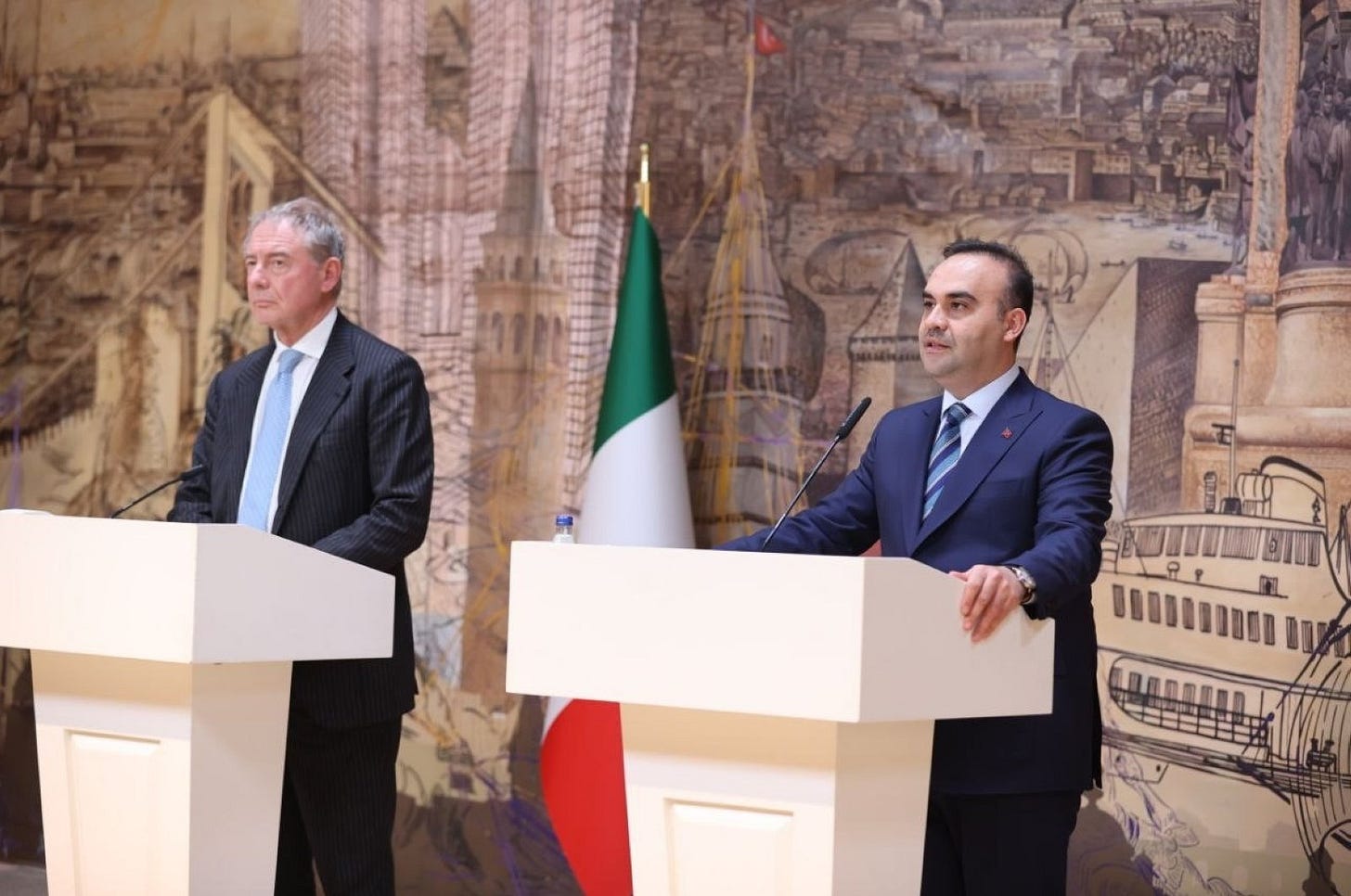
Türkiye and Italy Strengthen Investment Partnership in High-Tech Sectors, Including Space
Türkiye and Italy are strengthening their investment partnership, with a particular focus on high-tech sectors, including defense, aviation, and space. Industry and Technology Minister Mehmet Fatih Kacır highlighted Baykar’s acquisition of Italy’s Piaggio Aerospace as a pivotal step in fostering industrial and technological collaboration between the two countries. Speaking alongside Italy’s Minister for Enterprises and Made in Italy, Adolfo Urso, Kacır emphasized Türkiye’s growing role as a hub for Italian companies, citing its logistical advantages, young workforce, and extensive trade agreements that provide access to a billion consumers. Bilateral trade has surged to $32 billion, exceeding initial targets, and both countries are exploring opportunities for joint investments in third markets. Urso, who personally oversaw the Baykar-Piaggio Aerospace acquisition, noted its potential to advance drone manufacturing in Europe. He also acknowledged increased Turkish investments in Italy, including by the Koç Group. As preparations continue for the upcoming intergovernmental meetings in April, both ministers underscored the strategic importance of their deepening economic ties, positioning Türkiye and Italy as key players in global industrial and technological markets.
Analyst: Türkiye’s Ambitious Space Program Will Need Increased Funding to Succeed
In Al Monitor, Barin Kayaoglu writes that Türkiye is advancing its space ambitions with plans for a satellite launch site in Somalia, expanding its domestic satellite capabilities, and leveraging its defense sector expertise. However, experts stress that significant progress will require increased funding, stronger domestic collaboration, and strategic international partnerships. The Turkish Space Agency (TUA), established in 2018, has been central to these efforts, working alongside organizations such as TUBITAK and Turkish Aerospace Industries (TUSAS). The country’s growing private sector, including Baykar’s Fergani Space, is also developing GPS satellites and rockets to reduce reliance on Western infrastructure. While Türkiye’s space budget remains modest—$140 million for research and development in 2025—analysts argue that space technologies are critical for national security, economic growth, and technological independence. The proposed Somalia launch site offers a strategic equatorial position, enhancing the efficiency of satellite launches, and could serve as a regional hub for allied nations seeking access to space. Despite political and economic challenges, Türkiye is positioning itself as a key player in the emerging space economy, aiming to attract partnerships with countries such as Egypt, Indonesia, Qatar, and the UAE. While Western media skepticism persists, Turkish experts maintain confidence that their nation will secure a prominent role in the global space sector.
Opinion: Türkiye’s Space Program Shifting Towards Self-Sufficiency
In the Daily Sabah, Nazmelis Zengin writes Türkiye's expanding space ambitions, led by the Turkish Space Agency (TUA) and private sector players like Aselsan, Roketsan, and Fergani Space, signal a strategic shift toward technological self-sufficiency and economic resilience. Despite criticism from Western media, Türkiye's space program is not a vanity project but a structured national initiative aimed at deep-space exploration, satellite development, and secure communications. The country’s first Moon mission will demonstrate its capabilities in navigation, propulsion, and communication, leveraging expertise gained from domestically-produced satellites. Additionally, Türkiye is investing in a new spaceport and hybrid rocket technology to enhance independent access to space. The broader global space economy, valued at $546 billion in 2023, is no longer dominated solely by traditional powers, as emerging players like Türkiye, India, and the UAE assert their presence. Türkiye's participation in space exploration aligns with its geopolitical vision of technological sovereignty, ensuring it is not merely an observer but an active contributor to the evolving global space order.
Egypt Space Developments
Egypt’s Nilesat Reports Strong Financial Performance in 2024
Nilesat, Egypt’s commercial satellite communications company, reported a strong financial performance in 2024, with net profits rising 31.83% year-on-year to $57.681 million, up from $43.754 million in 2023. Despite a slight dip in total operating revenue to $101.140 million from $101.824 million the previous year, the company maintained solid profitability, driven by its satellite broadcasting and broadband services. Notably, Nilesat’s net profits for the first nine months of 2024 had already surged 26.77% year-on-year, reflecting sustained growth in demand for its services. As Egypt’s leading satellite operator, Nilesat’s financial results underscore its resilience in a competitive regional market, reinforcing its role as a key player in satellite communications across the Middle East and North Africa.
Egypt and France Discuss Space Issues, Participation in New Space Africa 2025 Conference
France’s Ambassador to Cairo, Éric Chevallier, has commended the advancements of the Egyptian Space Agency (EgSA), highlighting its developed infrastructure and growing expertise in space technology. During a visit to the agency, Chevallier met with EgSA CEO Sherif Sedqi, who provided an overview of the agency’s latest technological capabilities and strategic initiatives. Sedqi also extended an invitation for France to participate in the upcoming New Space Africa 2025 conference, which Egypt will host in April 2025. The visit underscores Egypt’s expanding role in the African and Middle Eastern space sector and its commitment to international collaboration in space technology and policy.
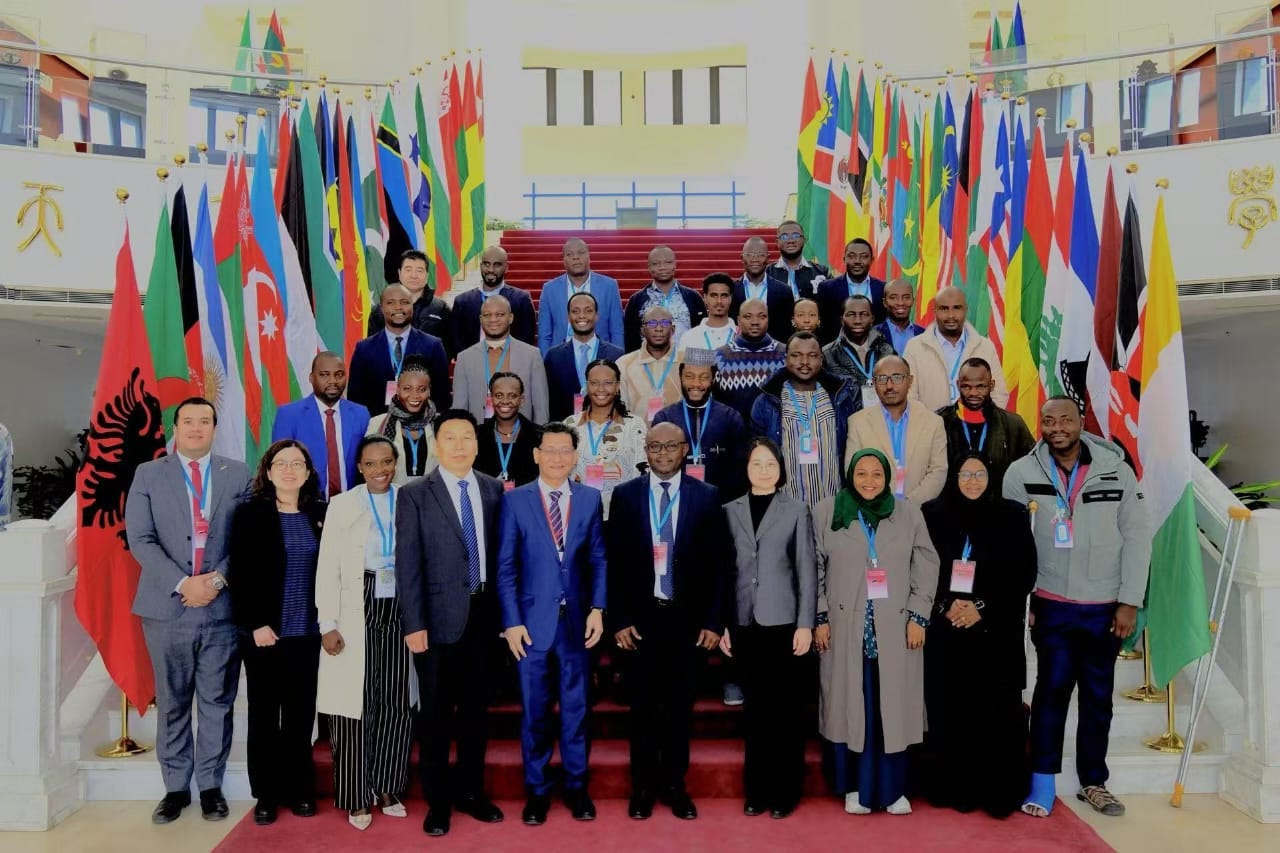
Egypt Plays Central Role in China-Africa Space Cooperation Initiatives
Egypt is playing a central role in China-Africa space cooperation, as highlighted in the newly launched China-Africa Cooperation in Satellite Remote Sensing Applications (CACSA) seminar. Hosted by China’s Academy for International Business Officials (AIBO) and the Land Satellite Remote Sensing Application Center (LASAC), the two-week event includes officials from Egypt and other African countries, focusing on leveraging satellite technology for agriculture, environmental management, urban planning, and disaster response. China’s broader space engagement with Africa includes infrastructure projects such as Egypt Space City, which houses a satellite Assembly, Integration, and Testing (AIT) facility, and the development of key satellites like Egypt’s MisrSat-II and the Horus series. The seminar builds on commitments made at the 2024 Forum on China-Africa Cooperation (FOCAC), reinforcing Africa’s access to advanced space technologies through technology transfer, capacity-building programs, and expanded satellite data accessibility. With initiatives like the BeiDou Navigation Satellite System and satellite-based agricultural monitoring tools such as CropWatch, China aims to deepen Africa’s space capabilities. For Egypt, this growing partnership strengthens its position as a regional leader in space technology, aligning with its ambitions to enhance satellite manufacturing, remote sensing applications, and overall space sector development.
Israel Space News
Israel’s IAI Ready to Offer UAE Its Optical, Radar, and Communication Satellite Solutions
Israel Aerospace Industries (IAI) participated in the UAE’s IDEX 2025 from 17 to 21 February 2025 in Abu Dhabi and highlighted its air defense systems, UAVs, radars, and electro-optical sensors, with CEO Boaz Levy emphasizing the strategic importance of IDEX for regional partnerships. Levy also noted the UAE’s significant investment in space infrastructure, positioning IAI’s satellite solutions—including optical, radar, and communication systems—alongside AI-driven real-time data processing as critical offerings to meet the region’s growing demand for advanced space capabilities.
Israel’s Creation-Space Plans to Build Space Testing and Simulation Site at Mitzpe Ramon
Israel’s Creation-Space is expanding the country’s space ecosystem beyond Earth’s orbit by fostering deep-space innovation through its accelerator program. Backed by U.S.-based CreationsVC, the initiative has committed $2.5 million to support ten Israeli startups developing dual-use technologies applicable both on Earth and in space. The program emphasizes advanced robotics, construction technologies, and materials science, with selected companies receiving up to $250,000 in funding and intensive industry training. As part of its broader vision, Creation-Space aims to establish Israel as a leader in deep-space commercialization, positioning Mitzpe Ramon as a strategic hub for space technology development. The initiative aligns with efforts to strengthen Israel’s GDP through deep-space ventures rather than traditional satellite technology. Future plans include building a space testing and simulation site, a research institute, and fostering global partnerships to integrate Israeli deep-space solutions into the emerging space economy.
Other Regional Space Developments
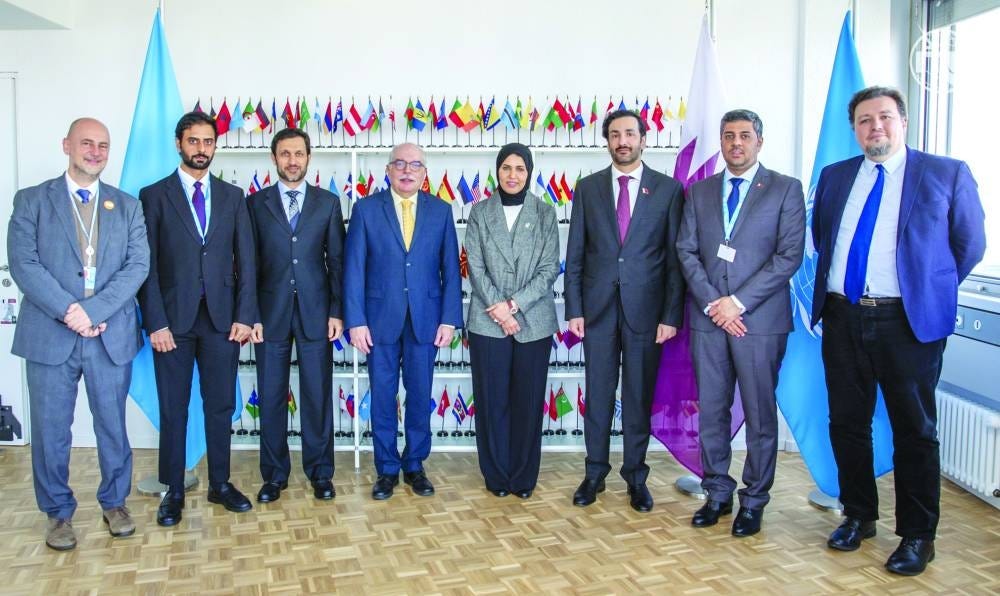
Qatar’s CRA to Cooperate With ITU in Mitigating Satellite Spectrum Interference
Qatar’s Communications Regulatory Authority (CRA) has signed a Memorandum of Understanding (MoU) with the International Telecommunication Union (ITU) to enhance global efforts in mitigating harmful interference to space services. Signed in Geneva, the agreement establishes a framework for cooperation in radio-frequency monitoring and interference resolution, with Qatar’s Space Radio Monitoring Centre (SRMC) providing technical assistance to ITU in detecting and resolving interference affecting geostationary and non-geostationary satellite networks. The SRMC, inaugurated in October 2024, is one of only 16 such facilities worldwide and the second in the region, reinforcing Qatar’s leadership in global space spectrum management. Equipped with a state-of-the-art control center, mobile monitoring station, and drone monitoring unit, the SRMC features the world’s first regulatory-owned Mobile Very Small Aperture Terminal (VSAT) Geolocation tool, enabling precise interference analysis. This partnership aligns with ITU’s regulatory framework and Qatar National Vision 2030, positioning the country as a leader in technological innovation and regulatory excellence. Under the MoU, CRA will support ITU in resolving interference issues impacting critical space services, including distress and safety communications, strengthening global telecommunications reliability, and ensuring the efficient use of the radio spectrum for future satellite deployments.
Iran to Bridge Digital Divide in Rural Areas by End of 2027
Iran is intensifying efforts to bridge the digital divide by ensuring 100% broadband coverage for all villages with over 20 households by the end of the Seventh National Development Plan (2023-2027), according to Nik Mohammad Balouch Zehi, an advisor to the Minister of Communications. With 10,000 villages still lacking high-speed connectivity, the government is prioritizing digital inclusion as a legal obligation and a pillar of communication justice. Meanwhile, Iran is also expanding its presence in the global ICT market, with knowledge-based companies exporting high-quality communication products, including to European markets. Former ICT Minister Issa Zare'pour emphasized Iran’s growing reputation as a leader in satellite manufacturing, launching, and operations, ranking among the top 10 countries in space sciences. Despite international sanctions, Iran continues to advance its space and digital infrastructure, reinforcing its position as a key player in telecommunications and satellite technology.
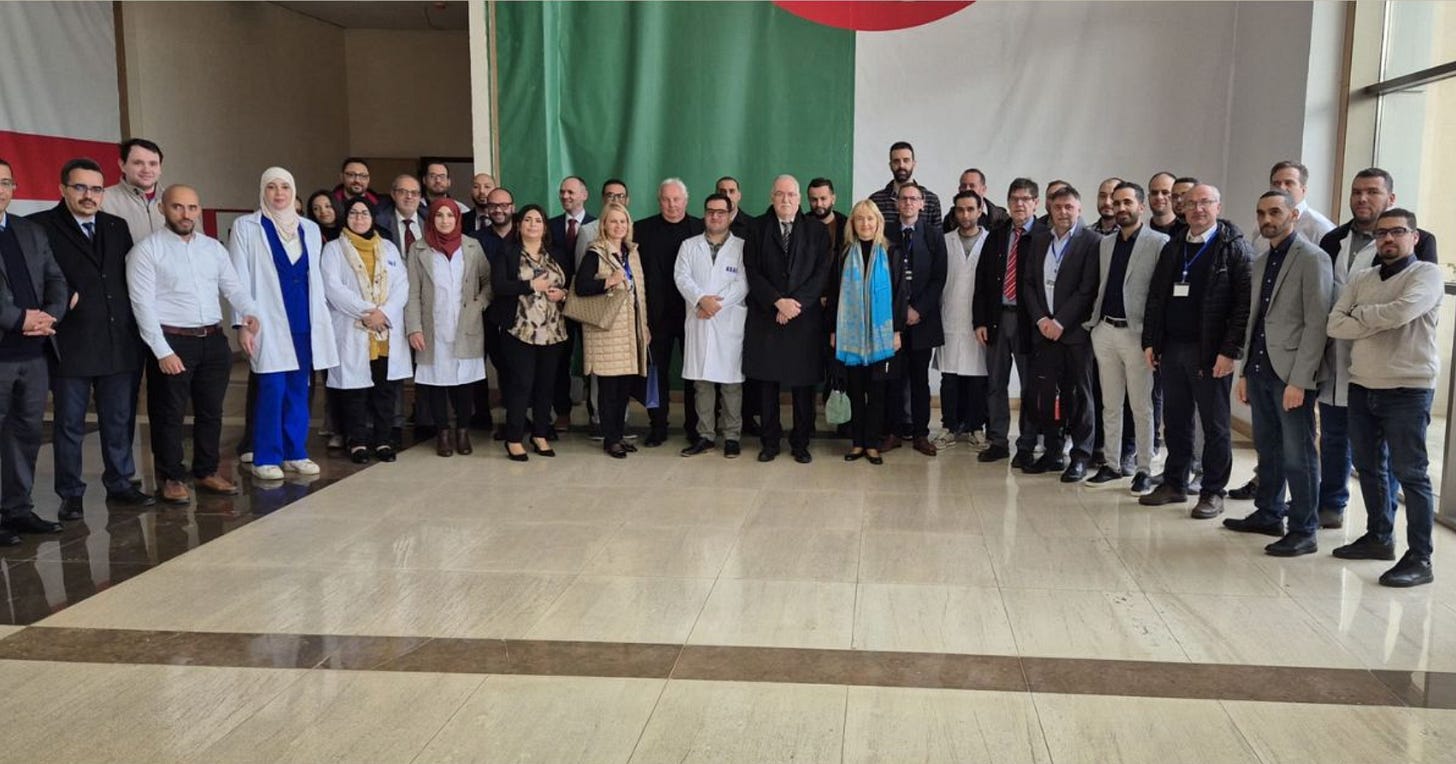
Algeria, Slovenia Cooperate in Space, Slovenia’s SkyLabs to Deliver Key Satellite Technologies to Algiers
The Algerian Space Agency (ASAL) and the Slovenian Space Office have initiated a strategic collaboration to advance satellite technology and space applications, following productive bilateral meetings in Algiers. Led by Slovenian Space Office Head Tanja Permozer, the discussions focused on mutual interests in satellite constellation missions and technology exchange. ASAL has identified Slovenia’s SkyLabs as a key partner for delivering critical technologies, reinforcing the growing cooperation between the two countries. SkyLabs Technical Director Dejan Gacnik engaged with ASAL leadership, including Dr. Mohammed Kameche and Dr. Habib Mahi, to explore concrete joint initiatives. The partnership is set to be formalized through a Memorandum of Understanding (MoU), emphasizing its strategic importance for both countries. The presence of Slovenian Ambassador Urška Kramberger Mendek further underscored the diplomatic and economic significance of this collaboration, positioning Algeria and Slovenia for deeper engagement in the global space sector.
Be sure to catch up with space activities in the region in the next edition of Middle East Space Monitor’s space roundup!










